Since the turn of the century we have seen a large roll call of players fortunate enough to taste the ultimate success in the AFL.
Among them are James Hird, Matthew Lloyd, Michael Voss, Jason Akermanis, Adam Goodes, Chris Judd, Ben Cousins, Jimmy Bartel, Gary Ablett Jr, Lance Franklin, Luke Hodge, Scott Pendlebury, Marcus Bontempelli, Trent Cotchin, Jack Riewoldt, Dustin Martin and Luke Shuey.
But sadly there are those who were not able to taste the ultimate success despite getting close many times, and there are others who will very likely end their careers without mounting the premiership dais.
With that in mind I have compiled what I consider to be the best 22 players to have not (and in the case of the few that are still playing, not yet) tasted premiership success.
This team only includes players who have debuted in the 21st century – that is, after the year 2000 – so players like Lenny Hayes, Matthew Pavlich, Brendan Fevola, Brad Green and Bob Murphy could not be considered. There are also a few current players in the side as well.
We start in the backline, which is anchored by ex-Adelaide Crows fullback and soon-to-be Essendon coach Ben Rutten, with Michael Johnson and Kade Simpson in the defensive pockets.
Nicknamed ‘Truck’, Rutten debuted in 2003 and developed into one of the game’s best fullbacks, coming of age in 2005 when he nullified the likes of Fraser Gehrig, Matthew Lloyd and Barry Hall, among others, winning All Australian honours for the only time in his career.
He formed a reliable partnership with Nathan Bock in the Crows backline in the back half of the noughties until the latter defected to the Gold Coast Suns at the end of the 2010 season.
However, Rutten will also be remembered as the player who cost the Crows a semi-final win against Collingwood when he gave away the free kick that resulted in Jack Anthony kicking the matchwinning goal in 2009.
Debuting in 2005 was Michael Johnson, who would prove to be a reliable member of the Dockers defence, which in 2013 conceded the least amount of points by any side during the regular season.
A four-game suspension for rough conduct on Lachie Hansen during the 2007 preseason and a five-game suspension incurred for bringing the game into disrepute in 2010 robbed Johnson of 250 AFL games, finishing on 244 when he retired in 2018.
For Kade Simpson to still be playing today is testament to his will to succeed in the face of adversity. He was Carlton’s first pick in the draft (45) after they were stripped of several early draft picks in 2002 and 2003 due to gross salary cap breaches.
Fortunately the Blues were able to get the best out of him, racking up over 300 AFL games and being the last remaining survivor from the draft that also produced the likes of Brendon Goddard, Daniel Wells and Jarrad McVeigh.
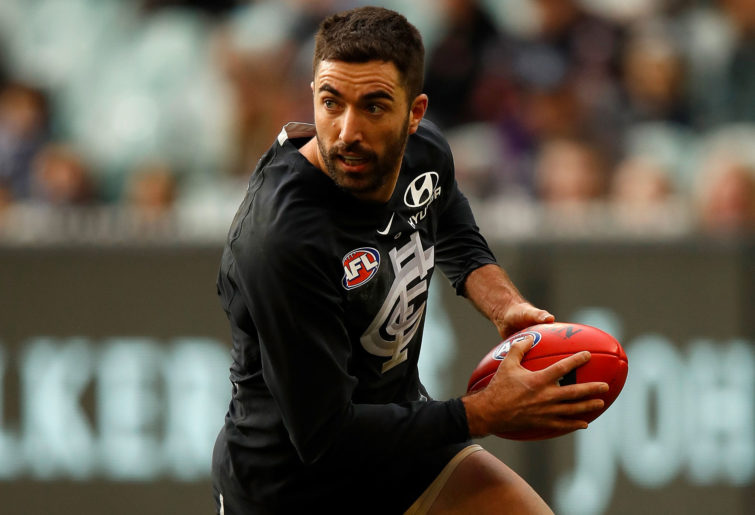
Kade Simpson (Michael Willson/AFL Media/Getty Images)
The halfback line is led by Daniel Merrett, who debuted in 2005 just as the Brisbane Lions’ on-field decline was starting to begin. He is assisted on the flanks by Leigh Montagna and Sam Gilbert.
Merrett was drafted with the 30th pick in the 2002 draft but would not debut until Round 2, 2005. In the intervention the Brisbane Lions would capture a third consecutive flag in 2003 and fall short of a record-equalling fourth consecutive flag in 2004.
Unknowingly to him at the time, he debuted at a rather unfortunate time in Lions history as several champion players, including then-captain Michael Voss, the Scott brothers, Jason Akermanis and co. neared the end of their careers.
Merrett would rack up 200 games in the backline, retiring in 2016 and then becoming an assistant coach to the Brisbane AFL Women’s side. In the absence of Craig Starcevich he would coach the side to a draw against the Gold Coast Suns earlier this year.
Gilbert and Montagna both debuted for St Kilda during the noughties and would become mainstays in the Saints defence, playing in the 2009 and 2010 grand finals only to be denied by Geelong and Collingwood respectively.
After St Kilda’s on-field fortunes declined, both continued to serve the club well before Montagna hung up the boots in 2017, followed by Gilbert at the end of the 2018 season. These days Montagna is an AFL commentator for both Triple M and Fox Footy.
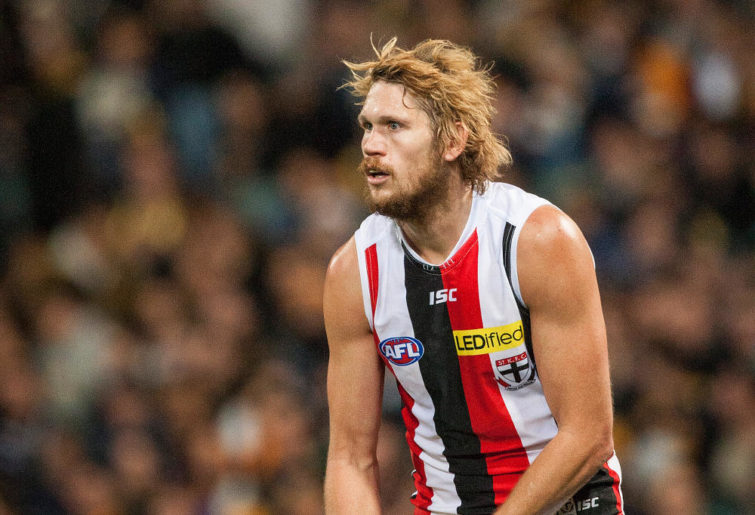
Sam Gilbert (AAP Image/Tony McDonough)
In the centre we have Matt Priddis, with current Adelaide Crows captain Rory Sloane and 2002 No. 1 draft pick Brendon Goddard on the wings.
Priddis stunned the AFL world when he won the Brownlow Medal in 2014, a year in which many expected Gary Ablett Jr to become the first repeat medallist since Robert Harvey in 1997-98 only for a shoulder injury to put paid to those hopes.
He became the first player since Shane Woewodin to win the medal without earning All Australian honours in the same season. However, Priddis would receive his first All Australian jacket the following season, in which he featured in the West Coast Eagles grand final side.
Sloane has been a consistent performer for the Crows since debuting in 2009, and prior to the season’s suspension he racked up his 200th AFL game, in which his side lost to the Sydney Swans by just three points after Taylor Walker missed a set shot at goal at the death.
Goddard proved to be a reliable player for the Saints during his time at Moorabbin before exercising his free agency rights at the end of 2012, moving to Essendon, where he later captained the club during the turbulent 2016 season.
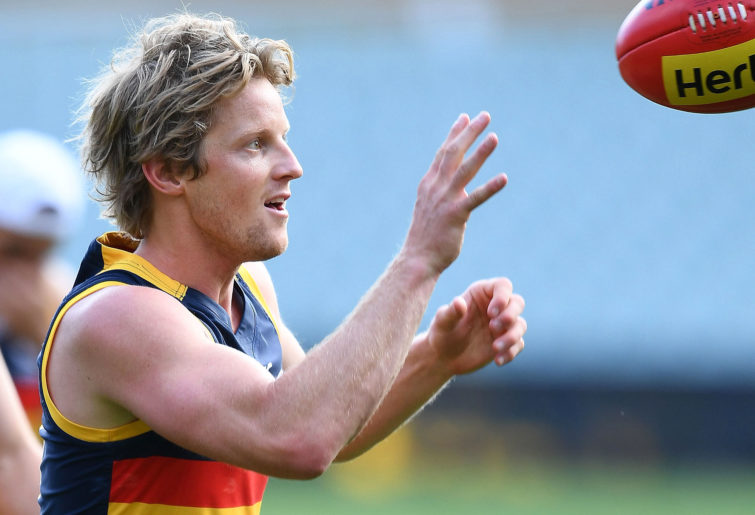
Rory Sloane (Mark Brake/Getty Images)
Nick Riewoldt is the centre half-forward and the captain, assisted on the flanks by Jarrad Waite and ex-Crows captain Taylor Walker.
Riewoldt, the top pick in the 2000 draft, debuted in 2001 and became captain of the club in 2005 under a leadership policy implemented by then-Saints coach Grant Thomas before becoming permanent captain from 2008 until 2016.
It was during this period the Saints reached three grand finals, and had it been for some luck in the first two, Riewoldt along with many others such as Sam Gilbert, Leigh Montagna, Brendon Goddard and Stephen Milne could so easily have been premiership players.
But it was not to be, and after the 2010 decider against Collingwood ended in a draw, the Saints would be crushed by 56 points in the replay.
Waite debuted with Carlton in 2003, and while he played mostly under the shadow of the club’s most prolific goal-kicker in Brendan Fevola, he managed to boot 252 majors in 184 matches before moving to North Melbourne as a free agent at the end of the 2014 season.
He would manage 125 goals in 60 games at Arden Street Oval before pulling stumps on his career at the end of the 2018 season, finishing just six games short of the 250-game milestone and 23 goals short of 400 goals.
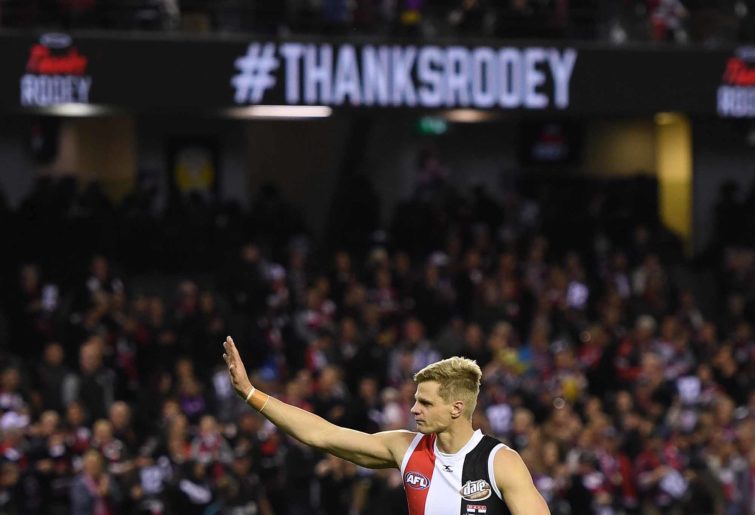
Nick Riewoldt (AAP Image/Julian Smith)
Up in the forward line we have the GWS Giants’ Jeremy Cameron, who has led his side’s goalkicking in every single year of the club’s existence, with Eddie Betts and Stephen Milne in the pockets.
Cameron has been a central figure throughout Giants history, being their first-ever All Australian in 2013 when he kicked 62 majors in a side that won only one game all season and their first Coleman Medallist in 2019 when he booted 67 during the regular season.
After briefly losing the Coleman Medal lead late last year, he kicked a career-best nine majors in the final round against the Gold Coast Suns to top the AFL goal kicking charts for the first time. He would later kick the first goal in the grand final, though the Giants would lose to Richmond by 89 points.
Cameron and the Giants are right in the mix for premiership contention this year, the club having started the season with an impressive 32-point win over the Geelong Cats before proceedings were suspended on 22 March.
Another one of the few still playing, Eddie Betts has entertained fans in over 300 games since his debut in 2005, kicking the goal of the year four times – 2006, 2015, 2016 and 2019 – and featuring in the Adelaide Crows 2017 grand final side.
After five years at West Lakes, Betts returned to Carlton but is yet to play a game after missing the opening round due to injury.
Stephen Milne is best known for his 11-goal haul against the Brisbane Lions in the final round of the 2005 season. Had the bounce of the ball gone his way in the 2010 grand final, the Saints would so easily have become premiers at the expense of Collingwood.
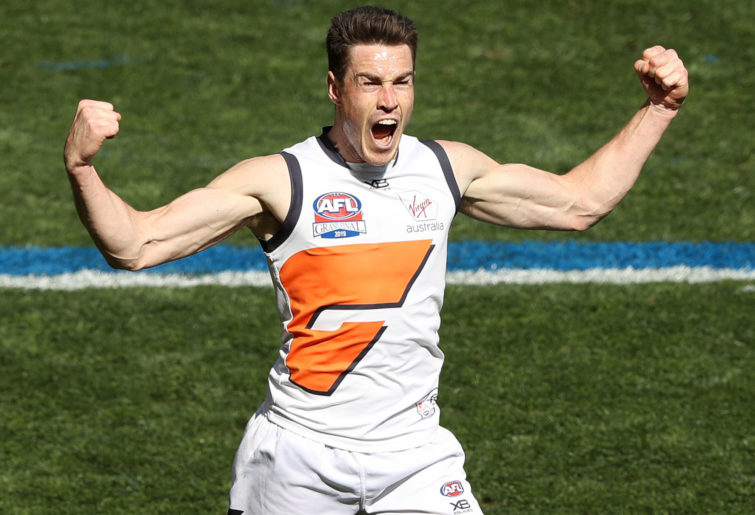
Jeremy Cameron (Robert Cianflone/AFL Photos/via Getty Images)
In the centre we have Aaron Sandilands, the game’s tallest ruckman, ex-Essendon captain Jobe Watson and 2016 Brownlow Medallist Patrick Dangerfield, whose 250th AFL game will come as soon as the AFL season recommences, likely to be towards the end of June.
Sandilands debuted in 2003 in what proved to be a breakthrough year for Fremantle, the club making the finals for the first time. Because of his height, he played nearly exclusively as a ruckman, though ventured up forward at times.
Also debuting that year was Jobe, the son of ex-Essendon champion Tim Watson, who would lead the club through the supplements saga in the middle part of the last decade.
After being named captain upon the retirement of Matthew Lloyd in 2009, Watson initially won the Brownlow Medal as the best and fairest in 2012, only for him to be stripped of the award after being found guilty of using a banned substance during the season in question.
He played his 200th AFL game in Round 14, 2015, but would not play another premiership match until Round 1, 2017, after he and 33 other players copped a season-long suspension for their roles in the supplements scandal.
He would retire at the end of the 2017 season after managing 20 games, the most he’d played in a single season for five years.
Patrick Dangerfield debuted in 2008 and spent eight years at the Adelaide Crows before being traded to the Geelong Cats in 2016, where he would win the Brownlow Medal polling a then-record 35 votes.
Of the active players that have been named in this side, he is the most likely to win a premiership before he retires, though it’s fair to say that time is ticking, especially with teammates Joel Selwood and Gary Ablett Jr both on the wrong side of 30 and close to retirement.
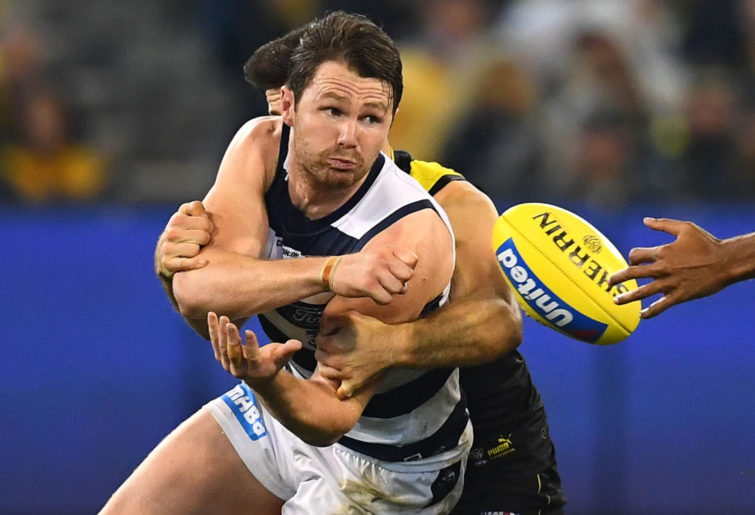
Patrick Dangerfield (Quinn Rooney/Getty Images)
On the interchange bench we have ex-Melbourne captain Nathan Jones, Essendon stalwart Brent Stanton, 2012 Michael Tuck Medallist Bernie Vince and Fremantle tagger Hayden Ballantyne.
Jones has been a rock in a Melbourne side that struggled through the majority of his career, playing two finals inside his first eight AFL matches in 2006 but then having to wait another 250 games or so to play three more finals in 2018.
In the intervention he became a ball magnet for the Dees, earning best and fairest honours in 2012, 2013 and 2014, and just narrowly missed selection in the preliminary All Australian squad of 40 in 2014. Had he been selected, all 18 clubs would’ve had at least one nominee.
Stanton played over 250 games for the Bombers and played in their most recent finals win against Melbourne in his debut year of 2004. He proved to be a consistent performer for the club right up until his retirement at the end of the 2017 season.
Vince racked up over 100 games for both the Adelaide Crows and Melbourne, winning the Michael Tuck Medal as best on ground in the former club’s NAB Cup grand final win in 2012 before being traded to Victoria as the Crows sought to improve their draft position in 2013.
At the Dees Vince instilled some experience and leadership to the success-starved team, usurping Nathan Jones as the club’s best and fairest in 2015 six years after winning Adelaide’s top gong and playing a key role in their rise up the ladder before retiring at the end of the 2018 season.
And last but not least is Hayden Ballantyne, who proved to be a fan favourite at Fremantle but not so among the supporters of the other 17 clubs for varying reasons.
He won the goal of the year award in 2011 and rose to prominence the following year for his niggling tactics designed to annoy and frustrate opponents. After a grand final shocker in 2013, he then topped the Dockers’ goalscoring in 2014 before being delisted in 2019.
The coach of the side is Ross Lyon, who will be remembered as one of the best coaches in the game not to win a premiership. He coached St Kilda to three grand finals in 2009 and 2010, including the replay, and also led Fremantle to the big dance in 2013.
At both St Kilda and Fremantle Lyon developed a defensively structured game plan that focused on the whole team applying defensive pressure when not in possession.
While his game plan has had some varying success, with the Saints conceding only 1411 points in 2009 and the Dockers 1518 points in 2013, it has copped plenty of criticism from fans and the media, who constantly labelled it as boring and ugly.
Lyon had served his coaching apprenticeship under Paul Roos at the Sydney Swans and was on the club’s coaching panel with John Longmire when the club defied the critics, among them then-CEO Andrew Demetriou and Robert Walls, to win the 2005 premiership.
In 2009 the Saints led for the majority of the game only to be overrun by the more experienced Geelong Cats in the final quarter, while in 2010 a second-half fightback was not enough as they were forced to settle for a draw against Collingwood.
The Saints proved to be no match for the Pies in the replay, losing by 56 points.
After leaving the club and then joining Fremantle in controversial circumstances the following year, he would lead the Dockers to their first grand final in 2013, where they lost to Hawthorn by 15 points.
The best non-premiership winning 22 of the 21st century
Backs: Michael Johnson, Ben Rutten, Kade Simpson
Halfbacks: Leigh Montagna, Daniel Merrett, Sam Gilbert
Centres: Rory Sloane, Matt Priddis, Brendon Goddard
Half-forwards: Jarrad Waite, Nick Riewoldt (c), Taylor Walker
Forwards: Eddie Betts, Jeremy Cameron, Stephen Milne
Followers: Aaron Sandilands, Jobe Watson, Patrick Dangerfield
Interchange: Nathan Jones, Brent Stanton, Bernie Vince, Hayden Ballantyne
Honourable mentions: Marc Murphy, Michael Rischitelli, David Swallow, Nat Fyfe
Coach: Ross Lyon
There were certain criteria that had to be met for players to be selected in the best 22 non-premiership winning team of the 21st century.
Criteria and breakdown
- Players must have debuted in 2001 or later. Only one player – Jeremy Cameron – debuted after 2009 (in 2012).
- While this team is mostly made up of players who have retired, seven current players have been selected. Of the seven, only Patrick Dangerfield and Jeremy Cameron are considered likely to win premiership medallions before they retire.
- All players have played at least 150 games.
- Nick Riewoldt is the captain. He, Kade Simpson and Brendon Goddard are the only players in the team to have played at least 300 games.
- Thirteen of the 22 have played in at least one grand final. All players have played at least two finals; only Daniel Merrett played in only one finals series.
- There are two Brownlow Medallists in the side: Matt Priddis (2014) and Patrick Dangerfield (2016). Jobe Watson also won the award in 2012 but was retrospectively ruled ineligible due to the 2012 supplements scandal.


































































































